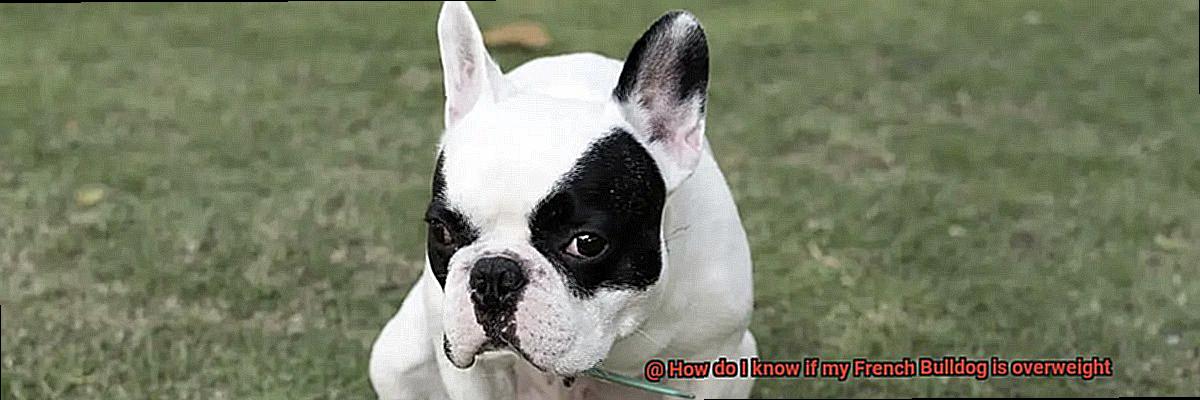How do I know if my French Bulldog is overweight?
French Bulldogs are undeniably adorable, but if their owners aren’t careful, they can become overweight.
Knowing how to tell if your French Bulldog is carrying too much weight is essential for keeping them healthy and happy. Are you worried that your Frenchie may have put on a few extra pounds?
If so, it’s important to know the signs of an overweight dog. In this blog post, we’ll explore what constitutes an overweight Frenchie and give you advice on how to tell if your dog is carrying too much weight.
We’ll also have tips on what steps to take if your dog is overweight and explain why it’s important to keep them healthy. So let’s get started.
Read on for all the information you need about how to tell if my French Bulldog is overweight.
Understanding the Ideal Weight for a French Bulldog
Contents
- 1 Understanding the Ideal Weight for a French Bulldog
- 2 Examining Your French Bulldog’s Body Condition Score (BCS)
- 3 Analyzing Your French Bulldog’s Breed Standard
- 4 Assessing Your French Bulldog’s Diet and Exercise Habits
- 5 Signs of an Overweight French Bulldog
- 6 Health Risks Associated with an Overweight French Bulldog
- 7 Tips for Helping Your French Bulldog Maintain a Healthy Weight
- 8 Consulting a Veterinarian for Professional Advice
- 9 Conclusion
Maintaining a healthy weight for your French Bulldog is essential for their well-being.

Knowing the ideal weight range and using the Body Condition Score (BCS) system can help ensure your pup remains in tip-top shape and prevent any potential health issues. The BCS system is like a scale for your pup – it assesses whether they are overweight or underweight.
A healthy French Bulldog should have a score of 4-5 on the BCS system, meaning you can feel their ribs, spine, and hips without them being covered in excess fat, and you should also be able to see a distinct waistline when looking at them from above.
However, even if your French Bulldog falls within the recommended weight range, it’s important to take into account their individual body condition to make sure they are not overweight or underweight.
If you’re unsure whether your dog is in the healthy weight range or not, it’s best to consult a veterinarian for medical assistance.
Examining Your French Bulldog’s Body Condition Score (BCS)
Examining your French Bulldog’s body condition score (BCS) is a must for any pup parent.
This system helps to ensure that our furry friends are maintaining a healthy weight, just like us humans have a scale to determine whether we’re overweight or underweight. It’s important to note that French Bulldogs have a stocky and muscular body, so their ideal weight may vary depending on their gender, age, and activity level.
The average BCS score for a French Bulldog is 4-To perform the assessment, you’ll need to evaluate several areas of your French Bulldog’s body such as its ribs, waistline, and back.
Without applying too much pressure, you should be able to feel the ribs easily and the waistline should slightly curve inwards. The back should also be level without any protruding bones or fat.
If you’re not sure what your pup’s BCS should be, seek the help of a veterinarian who can help keep your pup’s health in top shape.

Analyzing Your French Bulldog’s Breed Standard
Having a good understanding of the French Bulldog breed standard and assessing your pup’s individual body composition is key to determining whether they are at a healthy weight.
According to the American Kennel Club (AKC), adult male Frenchies should weigh between 16-28 pounds, and adult females should weigh between 16-24 pounds. However, it is important to note that weight can vary depending on their body type and activity level.
A healthy Frenchie should have a short, muscular build with a visible waistline and a tucked-up belly, as well as a broad chest with easily felt but not visible ribs. If you notice that your French Bulldog is starting to look round and overweight, it’s essential to take action in order to prevent health issues such as joint problems, heart disease, and diabetes.
Additionally, make sure your pup has plenty of exercise and stimulation in order to help them maintain a healthy weight and energy level.
Assessing Your French Bulldog’s Diet and Exercise Habits
Maintaining your French Bulldog’s health and wellbeing starts with assessing their diet, exercise habits, and weight.
A healthy Frenchie should weigh between 16-28 pounds and have a slightly muscular build with a defined waist. When feeling their ribs, there should be no visible bones but you should be able to feel them without pressing too hard.
Additionally, when viewed from above, you should be able to see a gradual taper from the ribcage to the hips. When it comes to diet, providing your pup with a high-quality dog food that meets their nutritional needs is essential.
Ensure that they are receiving appropriate portions for their height and activity level while avoiding any unnecessary fillers or additives. Exercise is also important for French Bulldogs.
However, take care not to overexercise them as their short noses can make breathing difficult for them.
Signs of an Overweight French Bulldog
When it comes to your beloved French Bulldog’s health, it’s important to know the signs of an overweight pup.
To determine if your Frenchie is carrying too much weight, look for visible fat deposits around its hips, belly, or neck. You should also be able to feel its ribs without pressing hard; if not, it may be overstuffed.
Furthermore, watch out for indicators related to its mobility and breathing. An overweight French Bulldog may have difficulty breathing, snoring loudly, or panting after completing routine activities such as walking or playing.
Additionally, the extra weight puts undue stress on its joints and could cause limping, reluctance to move, or difficulty getting up and down stairs. Lastly, consult with a vet for a more accurate assessment of your French Bulldog’s weight based on its breed and age.
A veterinarian can recommend dietary changes and exercise routines that are tailored to help them maintain a healthy weight.
Health Risks Associated with an Overweight French Bulldog
No one likes to see their beloved pup suffer, and if your French Bulldog is carrying too much weight, it can have a serious impact on their health.
An overweight French Bulldog can be vulnerable to a range of health issues, from joint pains to heart disease. The added weight can place extra stress on the joints of your pup, potentially leading to painful conditions such as hip dysplasia and arthritis.
Furthermore, since the French Bulldogs already have a narrow windpipe, the excess weight can cause further breathing difficulties like snoring, choking, and even sleep apnea. Obesity can also increase the risk of diabetes or heart disease such as high blood pressure, atherosclerosis, or cardiac arrest.
If not managed properly, these conditions can be incredibly painful and even fatal. Additionally, being overweight may reduce your pup’s life expectancy significantly.
For their overall wellbeing and happiness, monitoring your furry friend’s weight is essential.
Tips for Helping Your French Bulldog Maintain a Healthy Weight
Maintaining a Healthy Weight for Your French Bulldog: 8 Ways to Keep the Dog Fit and Happy.
Are you looking for ways to help your French Bulldog stay in shape? It’s essential to maintain a healthy weight for your furry companion, as obesity can lead to serious health issues. Here are eight tips to keep your French Bulldog fit, happy, and healthy.
Regular Exercise
Just like humans, dogs need regular exercise to stay fit. Take your French Bulldog for a daily walk around the block or play games with them indoors. Exercise is the most important factor in keeping them energized and healthy.
Proper Diet
A well-balanced diet is key when it comes to maintaining a healthy weight in dogs. Avoid overfeeding your pup and opt for high-quality dog food that is high in protein, vitamins, and minerals. Since treats can be high in calories and fat, serve them sparingly.
Monitor Water Intake
Water is essential for every living creature’s wellbeing but it can also lead to weight gain if given too much at once. Avoid giving too much water in one sitting and track their water intake throughout the day.
Regular Weigh-Ins
It’s important to monitor your French Bulldog’s weight regularly by visiting the vet or using a home scale. This helps you stay on top of their diet and exercise routine as needed so they remain at an ideal weight range for their breed specific height and gender.
Take Note of Body Condition Scores
The body condition scoring system helps determine whether your French Bulldog is overweight or underweight. Consulting with your vet will help determine your body condition score so you can be sure they are staying within a healthy weight range for their breed specific height and gender.
Avoid Overfeeding and Table Scraps
Overfeeding leads to obesity, which can cause serious health issues such as joint pains, respiratory problems, etc., so it’s best not to overfeed your dog. In addition, table scraps should be avoided because they can be high in fat and calories which could result in weight gain if not monitored properly over time.
Choose Quality Food
If not monitored properly, choosing quality dog food over ones that are packed with fillers and artificial preservatives will ensure that your pup receives all the essential nutrients without overeating excess calories or fat, which may lead to obesity over time.
Be Consistent
Last but not least, consistency is key when it comes to achieving a healthy weight. Maintaining a regular feeding regimen, exercise routine, weigh-ins, etc., will help you keep track of any changes in your dog’s weight.
Consulting a Veterinarian for Professional Advice
If your French Bulldog is looking a little on the plump side, consulting with a veterinarian is essential.
They can provide professional advice on a safe and healthy approach to help your dog lose weight. Your vet will examine your pup’s overall health and look for any underlying health issues that might be contributing to their weight gain.
When visiting the hospital, make sure you have information regarding your dog’s diet, activity level, and medical history ready. The doctor may also need to weigh your Frenchie and perform a physical exam before recommending any changes.
Depending on the results of the examination, your vet may suggest a weight loss plan that includes diet modifications and increased exercise. It’s important to follow their instructions closely and stick with the plan in order to help your French Bulldog achieve and maintain a healthy weight.
WxK99a2tn4k” >
Conclusion
It’s essential to maintain a healthy diet for your French Bulldog.
Knowing the ideal weight range and using the Body Condition Score (BCS) system can help ensure your pup stays in top shape and prevent any future health issues. The BCS system is like a scale for your pup – it tells you if they are overweight or underweight.
Additionally, learning the breed standard, analyzing their diet and exercise habits, determining their body condition score, and identifying the warning signs of an overweight dog are all necessary steps to take for their wellbeing. Joint pains, heart disease, diabetes, breathing difficulties, sleep apnea, and even reduced life expectancy are all typical problems associated with an overweight French Bulldog.
Fortunately, there are several ways to help achieve your pup’s desired weight. Regular exercise, proper dieting, monitoring water intake, regular weigh-ins, avoiding overfeeding and table scraps, choosing quality food items, and being consistent with feeding habits are all suggestions that may help keep them healthy.
If you’re uncertain what your pup’s BCS should be or have any questions or concerns about their progress after a weight loss program – don’t hesitate to consult with a veterinarian for expert advice.




